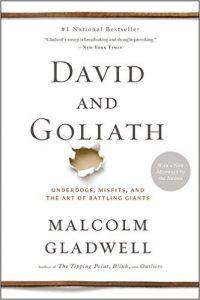3 Thoughts on David and Goliath by Malcolm Gladwell
 I read “Outliers” a few years back and really enjoyed it. I’ve been meaning to read his other books and recently read “David and Goliath” and really liked it!
I read “Outliers” a few years back and really enjoyed it. I’ve been meaning to read his other books and recently read “David and Goliath” and really liked it!
I highly recommend both books but wanted to put a few notes here about thoughts on David and Goliath.
There’s 3 main areas/thoughts I had on the themes of the book…
David and Goliath
1. Fighting Goliaths – You’re generally not going to fight a “Goliath” on their terms and win. You have to have a combination of playing to your strengths and finding their weaknesses.
When I worked at IBM, it was a time of fast changes in the computer/software industry. PCs were mainstream, people were wanting more and more out of them, there were many new players in the software world and everything ran on Windows.
IBM was working on OS/2 which was, in some key ways, better than Windows. But it was marketing driven with huge development teams and they couldn’t ever draw a line in the sand and release a version.
It was a slow turning ship in a speed boat slalom race.
Don’t fight Goliath hand-to-hand – he’ll win. Use your agility, speed and trajectory weapons to turn the tables.
2. Inverted U – good things are good to a point. Gladwell uses the example of wine. One glass of wine a day is good for you. Two glasses is good if not better. But at some point, it turns into a negative.
Too much of a good thing.
More is not always more… or better.
Some work is good… but at a point it’s a negative. Some working out is good: too much is too much. It goes on and on: sleep/rest, entertainment, food, etc. Find the right level of each “good” thing in your life.
3. Remote Miss – The British in WWII feared the emotional/mental trauma of Germany bombing the city and prepared in large ways. But they found it wasn’t necessary.
There are 3 types of people in a bombing: dead, near miss and remote miss. The dead don’t go on so there’s no additional effect. The near miss can be traumatic but for a given bombing there’s only a few of those.
The remote miss is more common – a single bombing might kill 1 or 2 (we’re talking about WWII city bombings) and have 1-5 near misses. But there could be dozens of remote misses.
The remote miss people, having survived a bombing, actually acquire more courage and confidence having lived through it.
There’s many examples of this in war, civil rights and even smaller examples of family tragedy and loss.
I really enjoy Gladwell’s style and thinking. I’m reading “The Tipping Point” now and really enjoying it. It’s amazing the number of examples and studies he can use and make very accessible.
I intend and hope to take away a lot from the books, but also I just enjoy them a lot. I have a hard time with novels a lot of the time – I tend to prefer non-fiction but like stories.

Leave a Reply